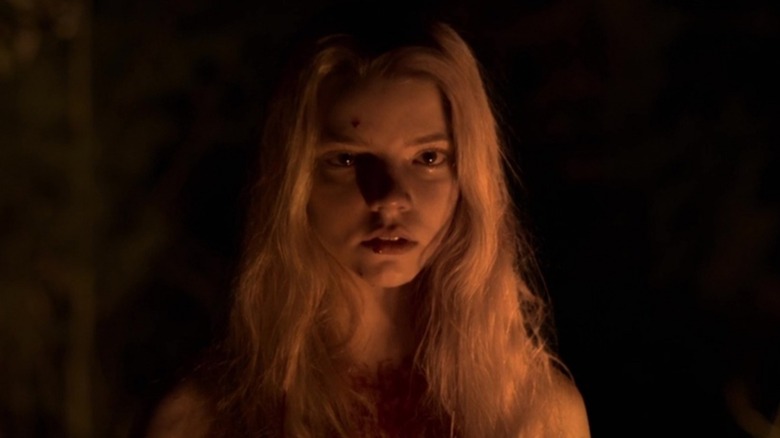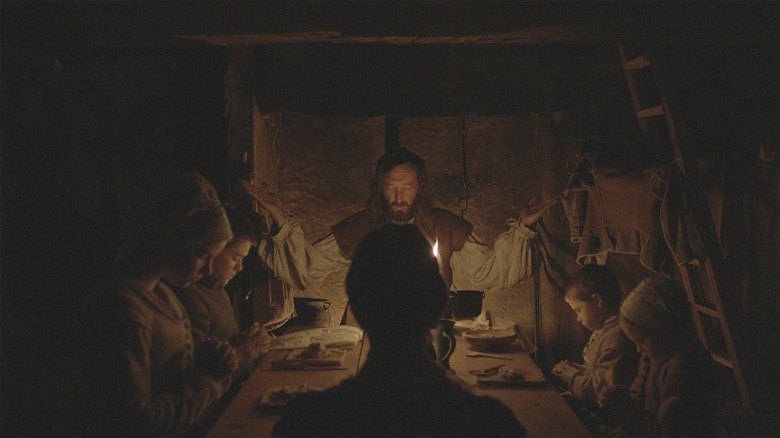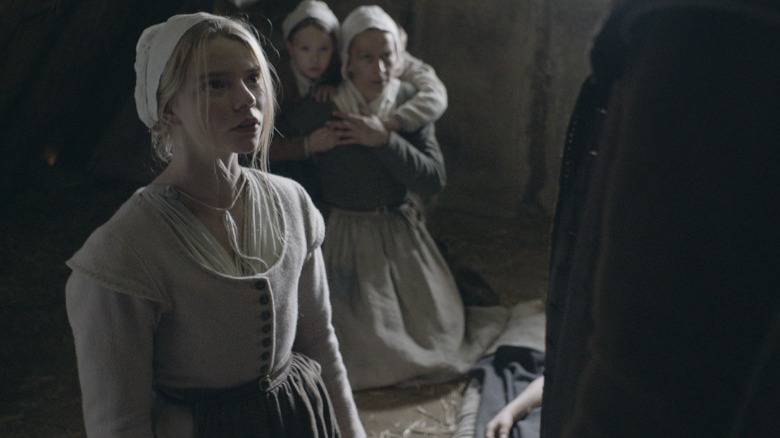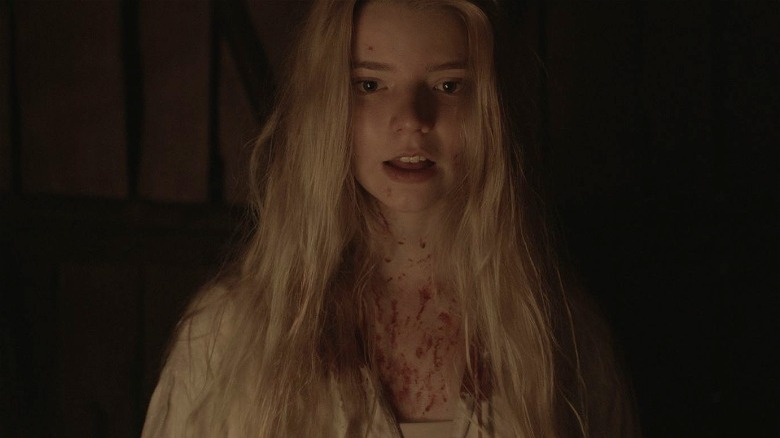The Witch Ending Explained: Wouldst Thou Like To Live Deliciously?
Folk horror has undergone a revival of sorts in the past few years, with more narratives turning to unsettling folk mythos and traditions to create tense, layered storylines. We fear what we do not understand, and this innate human sentiment acts as fuel for compelling horror stories about temptation, sin, and paranoia. Robert Eggers has cemented himself as a master storyteller with his black-and-white isolation horror, "The Lighthouse," but it's his directorial debut, "The Witch," that still manages to shock with its beautiful, horrifying ending.
Eggers' "The Witch: A New England Folktale," stylized as "The VVitch," relies purely on atmospheric tension and human folly to etch a terrifying tale about a doomed Puritanical family in the woods. Set in 1630s New England, the film follows family patriarch William (Ralph Ineson) and his wife Katherine (Kate Dickie) who, along with their kids, are excommunicated from their village and forced to fend for themselves in the woods. Belief and religion play a massive role in shaping character worldviews and motivations from the get-go, acting as the foundation for the dark events that unfurl as the film progresses.
Toward the end, Thomasin (Anya Taylor-Joy), who is unjustly slandered and psychologically abused by her folks throughout, decides to sign her name in the book of the devil. The decision to embrace her antithetical identity might be confusing at first, as Thomasin is the sole character who is aware of her shortcomings and had been true to her faith thus far. So why did Thomasin give into the self-fulfilling prophecy of being a witch in the woods? Let us dig deeper into the ending.
An obsession with the idea of sin
As the film begins, Thomasin's family is ousted from the community because William is believed to have committed the sin of conceit. Interestingly, Thomasin's introductory scene is one in which she prays fervently to God, and begs for forgiveness for her wavering faith. Even before the tragedies of the film unravel, there's considerable tension between Thomasin and the rest of her kin — they view her adolescence as a threat and temptation for sin. Being the eldest, Thomasin not only has to assume the role of caregiver but also contend with the continuous onslaught of abuse from her family, who blame her for everything.
After Samuel inexplicably goes missing during a game of peek-a-boo with Thomasin, Katherine is quick to blame her daughter. The accusations pile up as things go awry: Thomasin is blamed for a missing goblet that her father had swiped in secret and the twins accuse her of practicing witchcraft after their brother Caleb (Harvey Scrimshaw) is lured into a witch's dwelling in the forest, falls terribly ill, and eventually dies. Despite pleading innocence and swearing that her loyalties lie with her kin, Thomasin is repeatedly used as a scapegoat for the ill fate that haunts her family.
The obsession to frame Thomasin as the sinner is ironic, as the rest of the family remains deliberately oblivious to their own sins. Katherine is clearly envious of her daughter to the point that she cannot stand her, William is so conceited that he never attempts to make things right, and Caleb harbors lustful thoughts toward his own sister. The twins take turns representing both wrath and sloth, idly blaming Thomasin due to a prank she plays on them earlier in the film, inciting chaos within an already fractured family unit.
Blinded by religious fanaticism
While the rest of her family are blind to their own sins within a religious framework, Thomasin is acutely aware of her shortcomings, as evidenced by her introductory scene. Even when attacked and backed against the wall, Thomasin never does anything to harm her accusers, and instead tries her best to warn them against the twins talking to Black Phillip, the goat. While Thomasin is steadfast to her faith and religious morals, the others are obsessively pious and devoted to a flawed concept of sin and temptation, which eventually proves to be destructive.
William and Katherine are afraid that God is angry with them and punishing them for their sins. However, instead of bettering themselves or stopping to consider the mechanics of the tragic events, they blame a young girl as the reason behind their misfortune and brand her as "evil." The ever-escalating fear of being hounded by dark forces devolves into hysteria, which is heightened by every character's preconceived notions and deep-seated sentiments towards Thomasin.
Eggers injects layers of interpretation into the narrative, which are complex to parse.
On the one hand, we are faced with the pitfalls of religious hysteria and conservative attitudes towards women who are deemed "evil" simply because they exist, which echo the historical Salem witch trials that led to countless innocent deaths. On the other, Thomasin's covenant with God is deemed broken after she kills her mother in self-defense, which forces her to embrace the only alternative left: to become the very thing she was accused of. Moreover, evil forces within the context of Abrahamic religions exist throughout the film, as Black Phillip is revealed to be the devil and Thomasin joins a coven of witches in the end.
Does Thomasin make the right choice in the end?
The ending of "The Witch" invites multiple interpretations: while some view Thomasin's fate as a tragic outcome where she renounces her purity, others perceive it as an act of rebellion where she embraces true freedom. Whatever your takeaway, it is crucial to understand that Thomasin's choice to "live deliciously" stems purely from her circumstances, the alternative being a lonely, agonizing death.
Although one might think that the temptation of "butter" or a "pretty dress" are paltry offerings from the devil, these simple pleasures are luxuries for Thomasin, especially after the ordeal she undergoes. Underneath these earthly pleasures lies the freedom to be the other, unshackled by the fetters of societal expectations from women, especially within a Puritanical context.
After her family betrays her, Thomasin has nothing left. Traumatized and plagued by guilt, Thomasin speaks to Black Phillip, who reveals his true self. All she has to do now is shed her innocence (rather, the societal expectations of innocence and purity in young women) and sign her name in the devil's book. After all, even when she was faithful, she was constantly othered by her own blood and ostracized for things she was not responsible for. So why not become the witch of the woods and embrace aspects associated with the dark feminine?
Maybe Thomasin is damned now that she has joined the coven, who are seen smushing babies to create flying ointments and luring children to their demise throughout the film. However, for the first time, Thomasin is happy. She is ecstatic as she floats in the air, joined by her new kin while reveling in her newfound power.
In her damnation, Thomasin finds agency and empowerment. And this is a choice that is solely hers to make.



